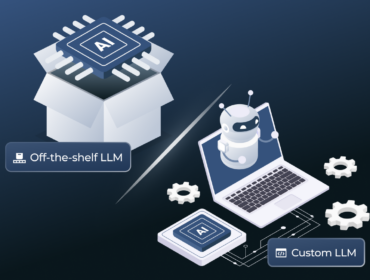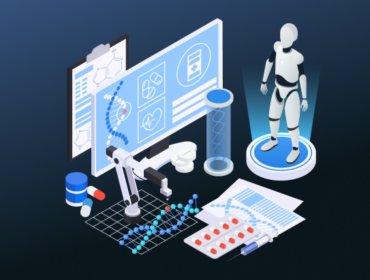Using different technologies in the creative industry is what contributes to creative results. The days of debating whether artificial intelligence (AI) will impact the music industry are long gone. Artificial intelligence has been embedded in a variety of applications for a number of years. With the help of AI, it is possible to make films more spectacular, unite viewers from different countries using online platforms, and optimize many of the most burdensome processes along the way.
But beyond film, how will AI affect the way we create and consume music? AI automates services, uncovers patterns and insights from massive datasets, and helps to improve outcomes within the music industry. Companies involved in the music industry need to be aware of the impacts of artificial intelligence on their activities so they can capitalize on it.
Artificial Intelligence in the Music Industry: Context
For almost 70 years, different attempts have been made to integrate IT technologies into music. The first composition, the 17-second computer-generated piece “The Silver Scale”, appeared in 1957. And this marked the beginning of an entirely new direction in programming.
During the second half of the 20th century, many algorithms were created that could generate music. For example, GenJam and GenBebop, could compose short jazz improvisations. Artificial intelligence in the music industry made a breakthrough: it learned how to generate symphonic works. One such program was Lamus, which created the “Hello World!” song in 2011.
Popular music wasn’t left out either. For the Lost Records of the Club 27 project, the neural network wrote a number of songs in the style of Kurt Cobain, Amy Winehouse, Jim Morrison, and other stars who passed away too young. While music and lyrics are computer-generated, vocals are not yet within the power of artificial intelligence, so vocalists are still needed for these bygone legends.
At the beginning of the 21st century, show business began to be conquered by virtual musicians without live prototypes. For example, the album “I Am AI” by American singer and actress Taryn Southern was created in collaboration with a musician under the pseudonym Amper, who turned out to be nothing more than a computer program.
However, the greatest impact AI has had is that it allows musicians to create professional-sounding music at a minimal cost, regardless of the devices they’re using. For example, the use of artificial intelligence helps Spotify weed through the 20,000 new songs posted to the site each day. The process of mastering music composition is expensive for many aspiring and inexperienced musicians. That’s why some music sites use AI to operate on a shareware basis, but still provide a full range of subscription services.
The music software based on AI also provides users with feedback on their performance as they learn to play new instruments. AI-powered technologies help composers create royalty-free music, low-cost music mastering systems, and other innovative learning tools.
Use Cases of AI in the Music Industry
A large segment of music and digital projects are built on AI’s ability to analyze the style of composers and their creations. Namely, streaming recommendation platforms.
At the same time, it is more difficult to work with musical AI content than with text, which is already information encoded into symbols, or an image, which is a much smaller amount of data. The sound is still difficult to analyze by the algorithm due to its multi-layered nature, the lack of clear timing intervals, and the higher weight. But the processes are constantly evolving. And in the early 2000s, the first recommendation music services appeared.
In mass application, artificial intelligence in music has become indispensable. First, in matters of systematization and personalization of entire volumes of musical works stored on streaming platforms and individual internet players. For example, over 75 million songs are available on Apple Music, 73 million songs can be found on Deezer, and over 50 million tracks are stored on Spotify. AI allows individual listeners to find any song they want to hear.
Let’s take a look at the most common AI applications in the music industry:
- Music composing
Using AI in the music industry is gaining in popularity every day. Consumers can use artificial intelligence to access various music composition and remix tools, allowing them to create their own beats and songs. The popularity of AI-generated music is on the rise, with many famous artists releasing AI-generated albums. Artificial intelligence technologies might help both beginners and experienced artists create their own unique music.
For example, there are tools like Amper, powered by AI for creating original music for creators in gaming, media, and other interactive technologies. Amper provides users with a sample library and datasets to generate new tracks tailored to any requirements they may have.
- Music streaming
In 2022, the global music streaming market reached $34.53 billion. The on-demand streaming service is one of the primary drivers of the global music recording industry, taking over 70% of the global music market share in 2023.
AI helps evaluate the listening habits and musical preferences of millions of people who use broadcast services. It is especially good for identifying patterns in tens of thousands of pieces of music.
A good example of that is Spotify Discover Weekly, an AI-powered tool that generates a weekly playlist for each user based on their artist preferences and listening habits. Spotify recommends music based on how you interact with different artists and songs, how often you play certain tracks in a loop, and other activities. The most important part is that millions of people are under constant assessment at all times, which allows you to see who else is listening to similar playlists.
- Music mastering
Music mastering has traditionally been done in special studios with specific acoustics, allowing people to detect issues with sound balance and spectral range.
Today, the music industry uses tools with artificial intelligence for this purpose Artificial intelligence can be integrated into the composition process to minimize manual work and human error, resulting in smoother flowing tracks. AI for composition has become more popular among younger, less experienced musicians. One of the main reasons for its popularity is the high-quality development of AI, which allows for a more streamlined and straightforward approach to music composition.
For example, LANDR, a creative platform for musicians that polishes music with the help of machine learning, trained its AI-powered mastering engine using data from many mastered tracks. Its algorithms also classify compositions based on production style.
AI in Music: Key Takeaways
It is predicted that 70% of companies will have a
adopted AI technologies in the music industry by 2030. There will certainly be significant changes between now and then and some artists already fear that technologies will replace them in the future; however, this is still very far from reality.
Today, AI-powered technologies are creating royalty-free music for creators, music mastering platforms, and educational apps that provide instant feedback and help protect copyrights.
Modern-day technologies help streamline a variety of musical composition processes. Without having to worry about performing so much of the grunt work, aspiring and existing artists can focus their creative energies on composing musical scores that were inconceivable just a decade earlier.
FAQ
1. How can AI be applied to the music industry?
Some of the applications of AI in the music industry include music composition and streaming, music production and remixing, as well as performance enhancement among others.
2. How will AI impact the future of music?
AI will most certainly streamline music production and mastering making it more accessible for the public. It will generate new revenue streams and protect copyright as well. The future of AI in music is quite promising; however, it will not completely replace artists and human creativity. Instead, AI will act as a tool to enhance audio quality and offer new possibilities for musical expression.
3. How can I start using artificial intelligence in my music business?
You can start using AI in your music business by defining your objectives and gathering and organizing data. You may plan on becoming the next Spotify and need an ML-powered recommendation system; or you may work in music production and plan to save a pretty penny on audio enhancement.
Whatever your requirements are, spell them out and find a reliable software development partner – like Unicsoft – to support you in your most ambitious AI initiatives.





![AI and Creative Industry: How Will AI Impact The Future of the Music Industry? What’s the EU Artificial Intelligence Act and How to Comply? [Webinar]](https://unicsoft.com/wp-content/uploads/2024/03/Cover_1140_v1.1-370x280.png)

